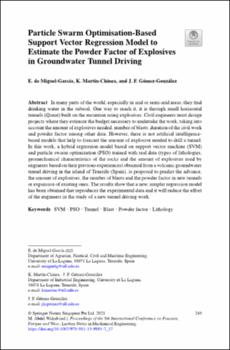Particle swarm optimisation-based support vector regression model to estimate the powder factor of explosives in groundwater tunnel driving
Fecha
2020Resumen
In many parts of the world, especially in arid or semi-arid areas, they find
drinking water in the subsoil. One way to reach it, it is through small horizontal
tunnels (Qanat) built on the mountain using explosives. Civil engineers must design
projects where they estimate the budget necessary to undertake the work, taking into
account the amount of explosives needed, number of blasts, duration of the civil work
and powder factor among other data. However, there is not artificial intelligencebased models that help to forecast the amount of explosive needed to drill a tunnel.
In this work, a hybrid regression model based on support vector machine (SVM)
and particle swarm optimization (PSO) trained with real data (types of lithologies,
geomechanical characteristics of the rocks and the amount of explosives used by
engineers based on their previous experiences) obtained from a volcanic groundwater
tunnel driving in the island of Tenerife (Spain), is proposed to predict the advance,
the amount of explosives, the number of blasts and the powder factor in new tunnels
or expansion of existing ones. The results show that a new, simpler regression model
has been obtained that reproduces the experimental data and it will reduce the effort
of the engineers in the study of a new tunnel driving work.






